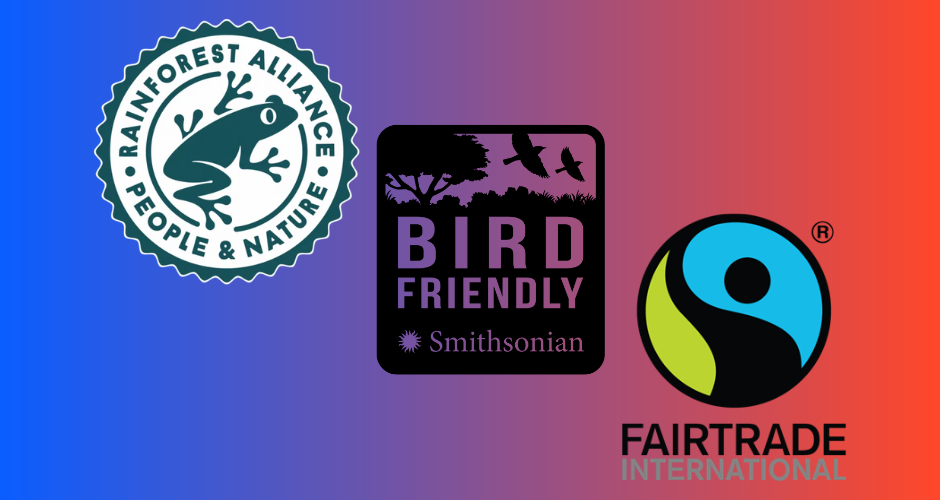 In a world where consumers increasingly value sustainable and ethically sourced products, coffee certification programs play a crucial role in guiding informed choices. Labels such as Rainforest Alliance, Fairtrade, and Bird-Friendly signify commitments to environmental conservation, social responsibility, and economic sustainability. In this guide, we'll decode these coffee certification programs, shedding light on what each label represents and how it contributes to a more sustainable coffee industry.
In a world where consumers increasingly value sustainable and ethically sourced products, coffee certification programs play a crucial role in guiding informed choices. Labels such as Rainforest Alliance, Fairtrade, and Bird-Friendly signify commitments to environmental conservation, social responsibility, and economic sustainability. In this guide, we'll decode these coffee certification programs, shedding light on what each label represents and how it contributes to a more sustainable coffee industry.
Rainforest Alliance
Environmental Sustainability: The Rainforest Alliance certification focuses on promoting sustainable farming practices that conserve biodiversity, protect ecosystems, and reduce the environmental impact of coffee production. Certified farms adhere to strict standards concerning water conservation, soil health, and the responsible use of agrochemicals.
Social Responsibility: The Rainforest Alliance certification also addresses social aspects, ensuring fair treatment of workers, promoting gender equality, and supporting local communities. Certified farms are committed to providing safe working conditions, fair wages, and access to education and healthcare for their employees.
Economic Sustainability: By supporting Rainforest Alliance-certified coffee, consumers contribute to the economic sustainability of coffee-producing communities. This certification emphasises the importance of fair trade practices, which help ensure that farmers receive a fair price for their coffee, empowering them to invest in the long-term viability of their farms.
Fairtrade Coffee
Environmental Sustainability: Fairtrade certification includes environmental standards aimed at promoting sustainable agricultural practices. While not as comprehensive as some other certifications, Fairtrade encourages farmers to minimise their environmental impact through responsible farming methods.
Social Responsibility: Fairtrade is synonymous with social responsibility, ensuring fair wages, safe working conditions, and community development funds for coffee farmers. The certification empowers small-scale farmers by providing them with the tools and resources they need to improve their livelihoods.
Economic Sustainability: Fairtrade certification guarantees that coffee farmers receive a minimum price for their coffee, regardless of fluctuations in the global market. Additionally, a Fairtrade premium is paid, which farmers can invest in community projects, education, and improving the overall quality of their coffee.
Bird-Friendly
Environmental Sustainability: The Bird-Friendly certification, established by the Smithsonian Migratory Bird Center, is focused on shade-grown coffee. Certified farms maintain a canopy of diverse, native trees, providing a natural habitat for migratory birds. This sustainable farming method promotes biodiversity and helps conserve delicate ecosystems.
Social Responsibility: While Bird-Friendly certification primarily focuses on environmental aspects, it indirectly contributes to social responsibility by promoting ethical and sustainable farming practices. The conservation of biodiversity benefits local communities by preserving natural resources and supporting ecotourism initiatives.
Economic Sustainability: By choosing Bird-Friendly certified coffee, consumers support the economic sustainability of farms engaged in environmentally friendly practices. This certification aligns with fair trade principles, contributing to the economic well-being of coffee farmers and their communities.
Making Informed Choices
Understanding these coffee certification programs empowers consumers to make choices aligned with their values. Whether you prioritise environmental conservation, social responsibility, or economic sustainability, each label provides a roadmap for purchasing coffee that positively impacts both the planet and the lives of those involved in the coffee supply chain.
As you savour your next cup, consider the story behind the label on your coffee bag. Your choice can be a powerful catalyst for positive change, supporting a coffee industry that values people, the environment, and the future of our beloved brew.



